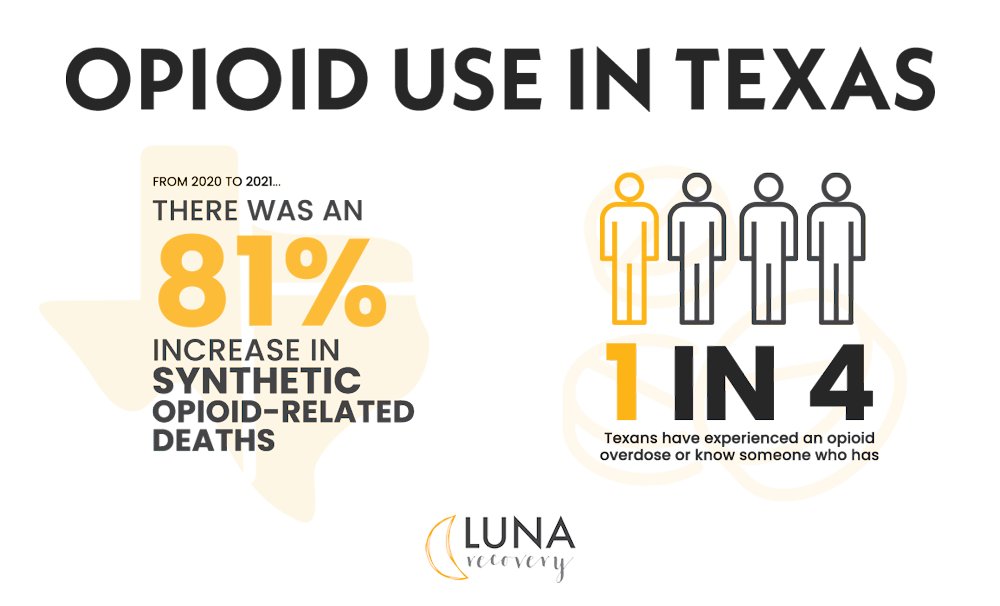Opioid Treatment Program in Houston, Texas
What Are Opioids (Painkillers)?
Opioids are a type of drug that is typically prescribed to patients to help relieve pain. Opioids work by binding to specific opioid receptors in the brain and spinal cord, which then reduces the perception of pain. Opioid drugs include both prescription and illicit drugs, such as:
- Prescription drugs: codeine, fentanyl, hydrocodone, oxycodone, morphine
- Illicit opioid drugs: heroin, opium
What Is An Opioid Treatment Program?
An opioid treatment program is a type of rehabilitation program that helps people who are addicted to opioid drugs recover and live healthy lives. The goal of an opioid treatment program is to provide individuals with the tools and resources necessary for them to overcome their addiction and lead productive lives.
An opioid treatment program is a specialized form of addiction treatment that is designed specifically for those struggling with opioids. These programs typically offer a combination of medication-assisted treatment and behavioral therapy, which is the most effective approach to treating opioid addiction.
Medication is used to help reduce the cravings and withdrawal symptoms associated with opioid addiction, while behavioral therapy helps patients develop healthy coping mechanisms and skills for dealing with stressors and triggers.
If you or someone you know is struggling with opioid addiction, there are many resources available to help. Treatment programs vary in intensity and length, but all provide support and guidance on the road to recovery. Opioid addiction is a serious condition, but with treatment, it is possible to overcome it and lead a healthy, productive life.

Opioid Epidemic in Texas

In recent years, opioid addiction has become a major problem in the United States. Opioid drugs include prescription painkillers such as Oxycontin and Vicodin, as well as illegal drugs such as heroin. These drugs are highly addictive and can lead to overdose and death.
Opioid addiction does not discriminate. It affects people of all ages, races, and socioeconomic backgrounds. However, certain groups are at higher risk of developing an addiction. People with chronic pain, for example, are more likely to be prescribed opioid painkillers. This can lead to addiction and, eventually, heroin use.
The good news is that there are opioid treatment programs available in Texas. These programs can help people overcome addiction and get their lives back on track.
If you or someone you know is struggling with opioid addiction, please don’t hesitate to seek help. An opioid treatment program can offer hope and can save lives.
Statistics About Opioid Addiction and Overdose in Texas
According to CDC Wonder, nearly 92,000 people in the U.S. died from a drug-involved overdose, including prescription opioids and illicit drugs in 2020. Overall, drug overdose deaths rose from 2019 to 2020 with about 91,799 drug overdose deaths that were reported in 2020.
Any deaths involving synthetic opioids other than methadone, so primarily fentanyl, continued to rise with 56,516 overdose deaths reported in 2020. Opioid addiction is a serious problem in Texas. Psychostimulants such as methadone continued to rise to about 23,837.
However, there is help available. Treatment programs can make a difference. If you or someone you know is struggling with opioid addiction, please don’t hesitate to reach out for help.
What Are the Types of Opioids?
There are many different types of opioids. Some common examples include:
How Can I Find an Opioid Treatment Program in Texas?
If you or someone you know is struggling with opioid addiction, there are many resources available to help you find an opioid treatment program in Texas. The first step is to speak with your doctor or a mental health professional, who can provide you with information about treatment options and make a referral to an opioid treatment program.
You can also contact your insurance company to find out what opioid treatment programs are covered under your plan. There are many opioid treatment programs available across Texas, so it is important to do your research to find one that meets your needs. Make sure to ask about the program’s philosophy on opioid addiction treatment, as well as its success rate.
It is also important to inquire about the types of services offered and whether the program is accredited by a national organization such as the Joint Commission. When you have narrowed down your choices, be sure to visit the opioid treatment program in person to get a feel for the environment and meet the staff.
After you have chosen an opioid treatment program, follow their specific instructions on how to begin the admissions process. Opioid addiction is a serious disease, but it is treatable. With the right opioid treatment program, you can get your life back on track.

Why Are Opioids Addictive?
Opioids are a class of drugs that include the illegal drug heroin, as well as legal prescription drugs like oxycodone, hydrocodone, codeine, and morphine. They are typically used to treat pain, but can also be used to treat coughing and diarrhea. Opioids work by binding to opioid receptors in the brain and spinal cord, which blocks pain signals and produces a feeling of euphoria.
While opioids can be effective at treating pain, they can also be highly addictive. Opioids are some of the most addictive substances available. Opioid addiction is a serious problem in the United States.
According to the National Institute on Drug Abuse (NIDA), more than 2 million Americans suffer from opioid addiction. Opioid addiction can lead to several problems, including overdose and death. Opioid overdoses are now the leading cause of accidental death in the United States.
The good news is that opioid addiction is treatable. There are several opioid treatment programs available, including medication-assisted treatment (MAT) and behavioral therapy. These programs can help people recover from opioid addiction and live healthy, productive lives.
If you or someone you know is struggling with opioid addiction, there is help available. Contact an opioid treatment program today to learn more about your options.
Signs and Symptoms of Opioid Addiction
Opioid addiction can be difficult to identify because it often starts with a legitimate prescription for pain medication. However, there are some signs and symptoms that may indicate a problem. These include:
- Taking someone else’s opioid medication
- Experiencing withdrawal symptoms when not taking opioids
- Neglecting responsibilities at home, work, or school due to opioid use
- Taking larger doses of opioids than prescribed or taking opioids more often than prescribed
- Engaging in risky behaviors, such as driving while under the influence of opioids
- Continuing to use opioids despite negative consequences, such as relationship problems or financial difficulties
- Craving opioids or thinking about them all the time, or compulsively seeking out opioids
If you notice any of these signs in yourself or someone you know, it’s important to seek help right away. Opioid treatment programs can provide the care and support you need to overcome opioid addiction and get back on track. If you or someone you know is displaying these signs, it may be time to seek help from an opioid treatment program.
Causes and Risk Factors of Opioid Abuse
There is no single cause of opioid abuse. Rather, it is a complex condition that can be caused by a variety of factors.
Some of the most common risk factors for opioid abuse include:
- A history of substance abuse or mental illness
- Family history of substance abuse or mental illness
- Traumatic experiences, such as childhood abuse or neglect
- Poor coping skills
- Limited social support
- Easy access to opioids
If you are struggling with opioid addiction, know that you are not alone. There are many opioid treatment programs available to help you get your life back on track. With the right treatment and support, you can overcome opioid addiction and live a healthy and fulfilling life.
Diagnosis And Opioid Addiction Treatment (Medications and Therapy)
If you or a loved one is struggling with opioid addiction, it is important to seek professional help. Opioid addiction is a serious medical condition that requires treatment by trained professionals. There are many opioid treatment programs available, and the best way to find one that meets your needs is to speak with your doctor or mental health professional.
Opioid addiction is typically treated with a combination of medication and therapy. Medications used to treat opioid addiction include:
Buprenorphine (Suboxone)
This medication helps to reduce cravings and withdrawal symptoms associated with opioid addiction.
Naltrexone (Vivitrol)
This medication blocks the effects of opioids, making it less likely that you will experience a relapse.
Therapy is an important part of opioid addiction treatment, and can help you to identify the underlying causes of your addiction and develop healthy coping mechanisms. An opioid treatment program typically offers both individual psychotherapy and group therapy.
If you or someone you know is struggling with opioid addiction, please seek help from a qualified treatment provider. Opioid addiction is a serious condition that requires professional treatment. There are many resources available to help you find the treatment you need.
Overcome Opioid Addiction at Luna Recovery Services
Luna Recovery Services in Houston, TX, is a premier opioid addiction treatment provider in Texas. We offer comprehensive treatment programs including detox, individual and group therapy, and aftercare planning. Our goal is to help you achieve lasting sobriety.
If you or someone you know is struggling with opioid addiction, please contact us today. We can help you get the treatment you need to break the addiction cycle and start living a sober, healthy life.


